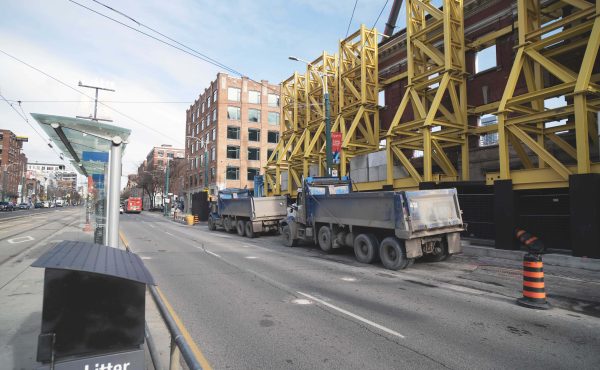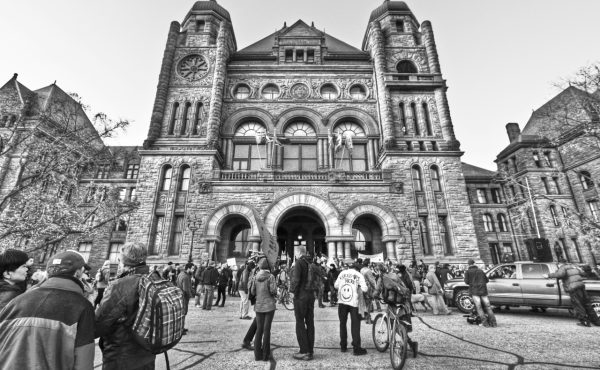• Sticky sidewalk situation resolved [ Toronto Star ]
• Wounded Miller turns to public [ Globe and Mail ]
• Enough with the backpacks already [ National Post ]
• Emperor Miller stands exposed [ National Post ]
• Student fights for subway [ Toronto Sun ]
Tuesday’s Headlines
By Julie Yamin
Read more articles by Julie Yamin




12 comments
I knew John Foden was a snake but now I just feel bad for him. His column in the Post is pathetic and indicative of why Jane Pitfield couldn’t get a shred of traction in the last election.
Just like the Pitfield campaign, the column jumps from one dim cliche to another, uses facts liberally and tries so hard to nail Miller with precise details that it misses.
I get the feeling that one day Foden will be found in his home, rocking back and forth, muttering “must get Miller” over and over.
But hey, it’s not(?) all bad news for Foden. According to this week’s Ontario Policy and Politics Monitor, Foden is registered as a lobbyist at Queen’s Park on behalf of the Canadian Energy-from-Waste Coalition (according to this link, Foden is the Director of the Coalition but, according to the Lobbyist Registry, he is a consultant lobbyist, as opposed to in-house.)
Yeah, the Foden article is really useless. It adds zero insight to the debate on what choices the city should make about taxation and spending.
Although I find most of the Foden article distasteful, I must admit that I share his opinion about the Executive Council. It’s seems rather undemocratic to have members of the council who are elected on the same terms as everyone else yet are granted special status by the mayor.
When the pigs reduced the commandments of Manor Farm to just one, “All animals are equal but some animals are more equal than others”, it signaled the end of their fragile fictional society. I don’t suggest that Toronto is heading for the same fate as the Animal Farm, but I do ask what good can be done by subverting simple democracy and replacing it with favoritism?
The organization of a strong “right-wing” contingent in council is clearly a reaction to the formation of a mayor-friendly Executive Council. By that logic, the mayor’s cabal of detractors is entirely of his own making.
Josh> That right-wing cabal was there long before the executive committee was set up though. Since Miller was elected there was always a defacto opposition. Perhaps it’s just formalized because the committee is a formal thing, now.
There is a right wing *minority* that is disorganized and rudderless. They got support from the middle who are concerned about their re-election possibilities. It wasn’t some policy shift — it was just protecting one’s back. And this is a public shaming of Miller, but this hasn’t been defeated, just deferred.
Anyway, even if the right-wingers on council banded together to become a ‘conservative’ coalition they would end up eating themselves. If you look at MP and MPP breakdown for TO, there is not one PC or Conservative member. Toronto voters traditionally do not vote for the PCs. If they wanted to try to run a slate conservative slate we would end up with almost an exclusive NDP and Liberal council, which might help this city (or just be patsies for the province). I’m not one for party politics at the local level, but if they right wingers want to start banding together under a conservative banner they will be reminded that the local electorate is not kind to conservatives.
Councillors like Ootes and Ford and Del Grande get elected because their is no political affiliation associated with them on their lawn signs and literature and since voter turnout is so poor municipally, you get incumbents being re-elected without the voters putting in much thought. If voters were basing their votes along political lines instead of recognition, surely Ootes would have lost the last election (he only won by 20 votes) and we would see others like Minnan-Wong and Grimes come crashing down.
Let me be clear — I’m not advocating for local political parties. I loathe them and appreciate pragmatic and independence at city hall. But, if those councillors do any research they will find themselves in a messy situation. You want to run under a conservative banner that can easily be associated with the government that is the original source of Toronto’s fiscal crisis? Let’s see them try.
Further to Shawn’s point, it’s taken that right-wing contingent more than four years to transition from a “governing” mindset (under Lastman) to “opposition” (under Miller) but they’ve been attempting to pull off what they did last Monday since the day Miller was elected.
Also, the Executive Committee isn’t all that much more powerful than the Policy & Finance committee it replaced. The only significant difference is that instead of working the backrooms of City Hall to get his picks appointed, now the mayor just writes a memo stating his selections.
I certainly agree with you Shawn, the long popularity of Mel Lastman taught us that there’s been a certain right-wing vein of city hall flowing for some time.
As to Matthew’s point about the right-wing contingent being “rudderless”, we had better cross our fingers that I stays that way. Even the most cursory examination of 20th century history shows us that it’s much easier for effective right-wing leaders to emerge than it is for their left-wing counterparts to take hold. We’ve lucked out in Toronto by having a left-leaning mayor, I voted for him twice for that very reason.
Regardless of whether or not this new body has more influence than previous incarnations, it certainly has a name that insinuates that it’s members are in one way or another above their colleagues. For a man who claims to be very lefty to create such a seemingly exclusionary group is rather troubling and inspires the allusions to “Animal Farm” I included in my last post.
And let’s not forget, these clowns couldn’t even get a picture taken amicably. Why should expect anything but a prolonged gong show from this Mayor and this Council?
Josh Hind writes:
It’s seems rather undemocratic to have members of the council who are elected on the same terms as everyone else yet are granted special status by the mayor.
It doesn’t seem undemocratic to me. How is it different from the prime minister appointing members of Cabinet?
It’s different because these members of council aren’t promoted to a specific portfolio, or to the management of a particular city department, as MPs are when they are picked for cabinet. Furthermore, MPs in cabinet don’t get an special abilities or privileges inside the House of Commons or the Legislature as I understand Executive Council members do. Cabinet members are subject to the normal provisions of Robert’s Rules and Parliamentary Rule.
In fact, the guidelines for the executive committee state the 4 of the members must not have a specific portfolio and are considered members-at-large. Now, that isn’t a broad distinction as, to the best of my knowledge, the only 2 standing portfolios in council are the TTC or the TPSB…feel free to correct me if I’ve missed something.
The whole thing seems like a bit of a useless exercise. Why wouldn’t the Mayor and the chairs of the standing committees work as a unit and then present their ideas to the council as a whole. These 4 “at-large” position seem to me to be nothing more than opportunity to reward a friend in good standing with a position with the big kids.
If Toronto moved to a more parliamentary system, that means political parties are not far behind. Having a government means having an opposition, with a leader and associated staff.
Maybe when Toronto gets more parliamentary ridings (more than 10 for Ontario van Loan by the way!) we can re-look at going to one councillor per fed riding rather than two.
I’m going to correct Josh — but only because he asked to be corrected.
The Executive Committee is comprised of the mayor, deputy mayor and standing committee chairs (no community council chairs.)
The four at-large positions are intended to diversify the perspective on the executive and ensure that there is room to make up for under/unrepresented constituencies (geographic, gender, race, etc.) Plus, without the at-large positions, the chair of Budget wouldn’t be on Executive Committee because chairing Budget and a standing committee would be an insane amount of work for one individual even though it’s important for the person most in tune with the City’s finances to be at the executive table.
And although the chair of a standing committee doesn’t exactly run a department like a minister would, they are the ones with the day-to-day political-level say in departmental matters.
Further, the two people who are explicitly not allowed to be on Executive Committee are the chair of the TTC and the chair of the TPSB. I’m not 100% sure why that is, though I imagine it has to do with workload and priorities (the chair of TTC often has tunnel vision when it comes to prioritizing transit projects over all else.)
The Executive Committee also has few extra powers and no one on EC has any additional or “special” powers, outside of those granted to them in the role of chair of a standing committee. The only additional power granted to EC as a whole is that it can dictate which committee deals with which item. That is a significant power but it’s not so much power that anyone not on EC is left powerless.
“(the chair of TTC often has tunnel vision when it comes to prioritizing transit projects over all else.)”
As opposed to roads projects like the Front Street Extension…